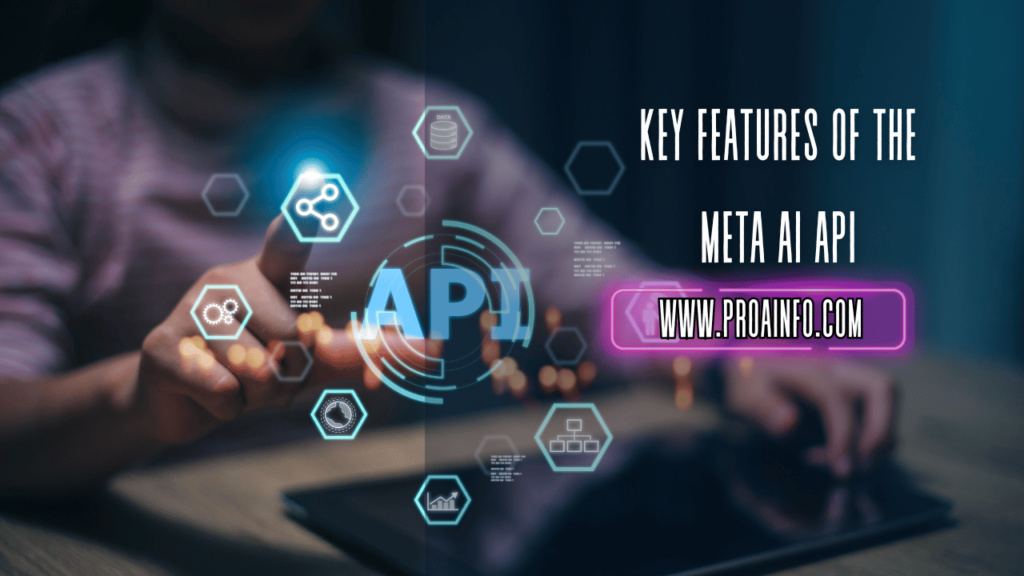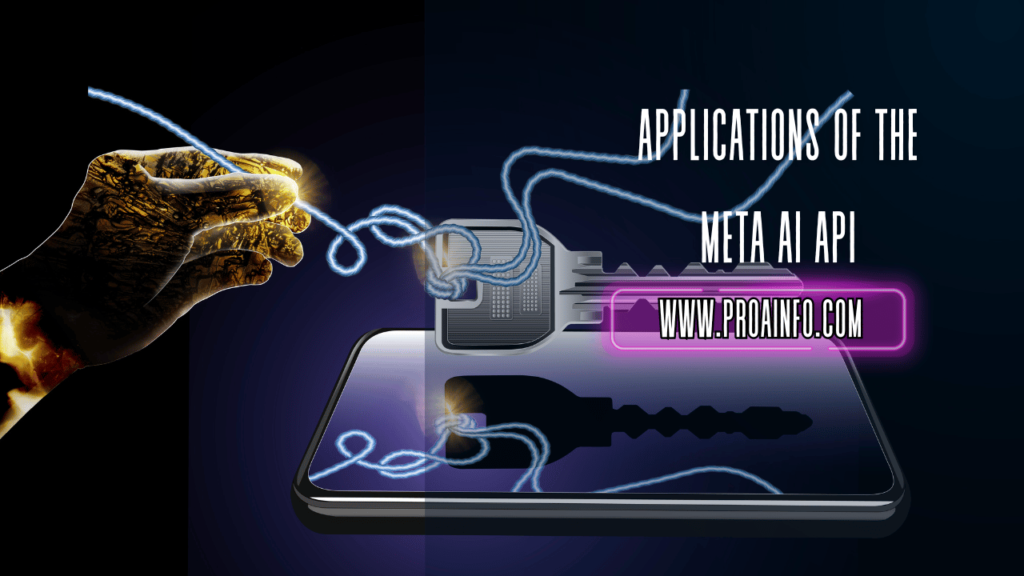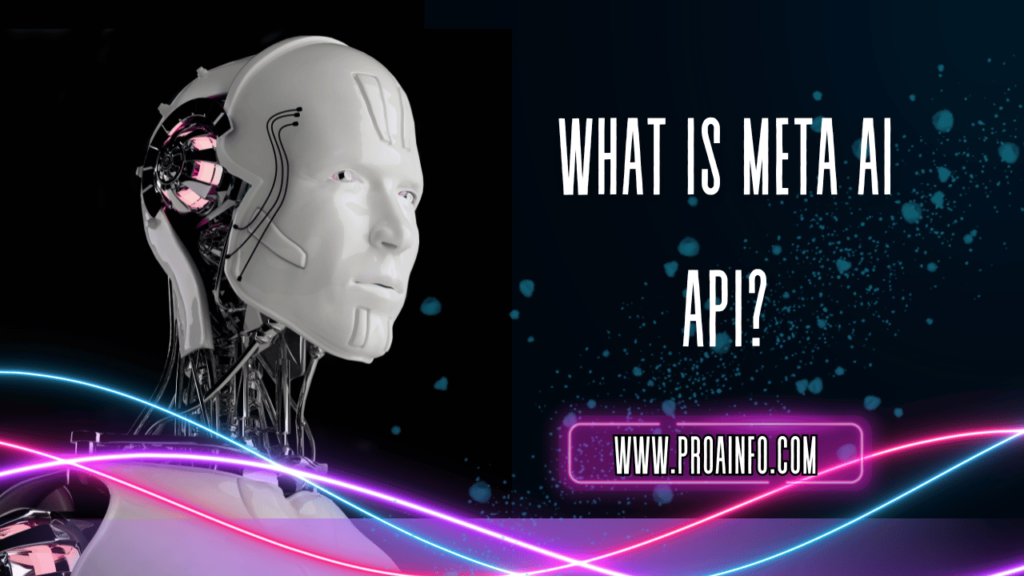What is meta ai api? In the rapidly evolving world of artificial intelligence (AI), Meta, formerly known as Facebook, has emerged as a trailblazer. With a deep commitment to advancing AI research and development, Meta has introduced a suite of AI-powered tools and platforms, among which the Meta AI API stands out as a game-changer.
This comprehensive article delves into the intricacies of the Meta AI API, exploring its features, applications, and the transformative potential it holds for businesses and developers alike.
What is Meta AI?

Before diving into the specifics of the Meta AI API, it’s essential to understand the broader context of Meta AI. Meta AI is the artificial intelligence division of Meta, dedicated to pushing the boundaries of AI research and development.
This cutting-edge division comprises some of the world’s leading AI experts, researchers, and engineers, all working tirelessly to create innovative AI solutions that can revolutionize various industries.
Meta AI’s primary focus lies in advancing AI capabilities across a wide range of domains, including natural language processing (NLP), computer vision, machine learning, and AI safety. Through groundbreaking research and the development of cutting-edge AI models, Meta AI aims to unlock new possibilities and empower businesses, developers, and researchers to leverage the transformative power of AI.
Understanding the Meta AI API
The Meta AI API is a comprehensive set of tools and interfaces that allow developers and businesses to harness the power of Meta’s AI technologies. By providing access to pre-trained AI models and powerful APIs, Meta aims to democratize AI and make it accessible to a broader audience, fostering innovation and accelerating the adoption of AI across various sectors.
At its core, the Meta AI API serves as a bridge between Meta’s advanced AI capabilities and the developers and businesses seeking to leverage these technologies. Whether you’re a seasoned developer, a data scientist, or a business seeking to integrate AI into your operations, the Meta AI API offers a powerful and flexible platform to explore and utilize Meta’s AI models and services.
Key Features of the Meta AI API

The Meta AI API encompasses a wide range of features and capabilities, enabling developers and businesses to unlock the full potential of AI. Here are some of the key features that make the Meta AI API a valuable resource:
- Natural Language Processing (NLP) APIs
- Text Classification: Categorize and analyze text data into predefined categories or topics.
- Named Entity Recognition (NER): Identify and extract named entities, such as people, organizations, and locations, from unstructured text.
- Sentiment Analysis: Analyze the sentiment (positive, negative, or neutral) expressed in textual data.
- Language Translation: Translate text from one language to another with high accuracy.
- Computer Vision APIs
- Image Classification: Classify and identify objects, scenes, or concepts within images.
- Object Detection: Detect and locate multiple objects within an image, along with their respective bounding boxes.
- Facial Recognition: Detect and recognize faces in images, enabling applications like facial authentication or personalized experiences.
- Speech Recognition and Synthesis
- Automatic Speech Recognition (ASR): Convert spoken audio into text transcripts.
- Text-to-Speech (TTS): Generate natural-sounding speech from text input.
- Conversational AI
- Chatbots and Virtual Assistants: Build intelligent conversational agents using Meta’s advanced language models and dialogue management capabilities.
- Personalization and Recommendation Engines
- Content Recommendation: Provide personalized content recommendations based on user preferences and behavior patterns.
- Product Recommendations: Offer tailored product recommendations to enhance customer experiences and drive sales.
- Scalability and Performance
- Cloud-based Infrastructure: The Meta AI API leverages Meta’s robust cloud infrastructure, ensuring scalability and high performance.
- Batch Processing: Process large volumes of data efficiently through batch processing capabilities.
- Customization and Fine-tuning
- Model Fine-tuning: Customize pre-trained AI models to better suit specific use cases or domain-specific data.
- Custom Model Development: Build and train custom AI models using Meta’s advanced machine learning frameworks and tools.
Applications of the Meta AI API

The Meta AI API’s versatility and powerful capabilities make it applicable across a wide range of industries and use cases. Here are some notable applications where the Meta AI API can provide significant value:
- Enhancing Customer Experiences
- Intelligent Chatbots and Virtual Assistants: Develop conversational AI agents to provide personalized and efficient customer support, answering queries, and assisting with various tasks.
- Sentiment Analysis: Gain insights into customer sentiments by analyzing feedback, reviews, and social media conversations, enabling data-driven decision-making.
- Content and Product Recommendations: Deliver personalized content and product recommendations to customers, improving engagement and increasing conversion rates.
- Automating Business Processes
- Intelligent Document Processing: Automate the extraction and analysis of information from various documents, such as contracts, invoices, and reports, streamlining workflows and reducing manual effort.
- Automated Data Entry and Validation: Leverage optical character recognition (OCR) and natural language processing capabilities to automate data entry and validation processes, minimizing errors and increasing efficiency.
- Enhancing Productivity and Collaboration
- Intelligent Writing Assistance: Leverage language models to provide writing suggestions, grammar correction, and content generation assistance, improving productivity and quality.
- Intelligent Meeting Transcription and Summarization: Automatically transcribe and summarize meetings, enabling better collaboration and information sharing.
- Fraud Detection and Security
- Fraud Detection: Leverage machine learning models to identify patterns and anomalies in data, enabling proactive fraud detection and prevention.
- Identity Verification: Utilize facial recognition and biometric authentication capabilities to enhance security and prevent identity fraud.
- Healthcare and Life Sciences
- Medical Image Analysis: Leverage computer vision models to analyze medical images, aiding in diagnosis, treatment planning, and research.
- Drug Discovery and Development: Accelerate drug discovery and development processes by leveraging AI models for molecular modeling and simulation.
- Retail and E-commerce
- Personalized Shopping Experiences: Provide tailored product recommendations and personalized shopping experiences based on customer preferences and behavior patterns.
- Inventory Management and Supply Chain Optimization: Utilize AI-powered demand forecasting and supply chain optimization techniques to streamline inventory management and improve operational efficiency.
- Media and Entertainment
- Content Generation and Curation: Leverage language models and computer vision capabilities to generate and curate engaging content, such as articles, videos, and social media posts.
- Personalized Content Recommendations: Deliver personalized content recommendations to users based on their preferences and viewing history, improving engagement and retention.
Getting Started with the Meta AI API
To begin leveraging the power of the Meta AI API, developers and businesses need to follow a few simple steps:
- Sign Up and Create an Account
- Visit the Meta AI API developer portal and create an account by providing the necessary information and agreeing to the terms of service.
- Obtain Access Credentials
- After creating an account, you will receive access credentials, such as an API key and secret, which are required to authenticate your requests and access the APIs securely.
- Explore Documentation and Samples
- The Meta AI API documentation provides comprehensive information on available APIs, endpoints, request/response formats, and code samples in various programming languages.
- Integrate the APIs into Your Applications
- Using the provided documentation and code samples, integrate the desired APIs into your applications or platforms, making the necessary API calls and handling the responses.
- Test and Deploy
- Thoroughly test your integration with the Meta AI API, ensuring proper functionality and performance. Once satisfied, deploy your AI-powered applications or solutions to production environments.
- Monitor and Optimize
- Continuously monitor the performance and usage of the Meta AI API, gathering insights and analytics to optimize your integration and ensure optimal resource utilization.
- Continuous Learning and Improvement
- Stay updated with the latest advancements in AI and the Meta AI API by regularly reviewing documentation, attending workshops, and engaging with the developer community.
- Continuously evaluate and fine-tune your AI models to improve their performance and adapt to changing requirements or data patterns.
- Cost Optimization
- Carefully plan and monitor your API usage to optimize costs, taking advantage of features like batch processing and auto-scaling when appropriate.
- Regularly review usage metrics and billing reports to identify opportunities for cost savings.
- Collaboration and Knowledge Sharing
- Foster collaboration within your organization and across teams to share knowledge, best practices, and insights related to the Meta AI API implementation.
- Engage with the broader developer community, attend events, and participate in forums to learn from others’ experiences and contribute to the collective knowledge.
The Future of Meta AI and Its APIs
- As AI continues to evolve at an unprecedented pace, Meta AI remains at the forefront of innovation, driving groundbreaking research and development. The Meta AI API is poised to play a pivotal role in shaping the future of AI adoption and democratization.
- Continuous Advancements and Expansion Meta AI’s relentless pursuit of excellence ensures that the Meta AI API will continue to evolve, incorporating the latest advancements in AI research and technology. New capabilities, improved models, and enhanced performance are expected to be introduced regularly, empowering developers and businesses to stay ahead of the curve.
- Multimodal AI and Unified Experiences One of the exciting frontiers in AI is the development of multimodal AI systems that can seamlessly integrate and process various data modalities, such as text, images, audio, and video. Meta AI is actively researching and developing multimodal AI models, which could lead to more unified and intuitive experiences within the Meta AI API, enabling applications that can understand and reason across multiple modalities.
- Responsible AI and Ethical Considerations As AI becomes increasingly pervasive, ensuring responsible and ethical AI development is paramount. Meta AI is committed to addressing challenges related to AI safety, fairness, transparency, and accountability. This focus on responsible AI will likely shape the future of the Meta AI API, with built-in safeguards, governance frameworks, and ethical guidelines to mitigate potential risks and unintended consequences.
- Democratization and Accessibility Meta’s mission to democratize AI aligns with the broader goal of making advanced AI capabilities accessible to a wider audience. The Meta AI API is expected to continue simplifying the integration and deployment of AI solutions, enabling businesses of all sizes and developers across various domains to leverage the power of AI efficiently and cost-effectively.
- Collaborative Ecosystem and Open Innovation While Meta AI drives internal research and development, it also recognizes the value of collaboration and open innovation. The Meta AI API ecosystem is likely to expand, fostering partnerships with academic institutions, research organizations, and other technology companies. This collaborative approach will accelerate the pace of innovation and foster a vibrant community of developers and researchers working towards a shared vision of advancing AI for the greater good.
Conclusion
- The Meta AI API represents a significant milestone in the journey towards democratizing AI and unlocking its transformative potential across industries. By providing developers and businesses with access to cutting-edge AI models and services, Meta AI is empowering innovation and enabling a wide range of applications that can revolutionize how we live, work, and interact with technology.
- As the adoption of AI continues to accelerate, the Meta AI API positions itself as a powerful enabler, simplifying the integration of AI capabilities and opening doors to new possibilities. Whether it’s enhancing customer experiences, automating business processes, or driving groundbreaking advancements in fields like healthcare and scientific research, the Meta AI API offers a comprehensive toolkit for leveraging the power of AI.
- However, with great power comes great responsibility. As we embrace the Meta AI API and AI in general, it is crucial to prioritize ethical and responsible AI development, ensuring adherence to data privacy and security standards, as well as principles of fairness, transparency, and accountability.
- The future of Meta AI and its APIs is brimming with exciting possibilities, driven by continuous advancements in research, a commitment to open innovation and collaboration, and a vision to democratize AI for the greater good of society. As we embark on this transformative journey, the Meta AI API stands as a testament to Meta’s dedication to pushing the boundaries of what’s possible with AI, empowering developers and businesses to shape a future where AI is not just a technological marvel, but a catalyst for positive change and progress.
FAQs
What is the Meta AI API?
The Meta AI API is a comprehensive set of tools and interfaces provided by Meta (formerly Facebook) that allows developers and businesses to access and integrate Meta’s advanced artificial intelligence (AI) capabilities into their applications and platforms.
What AI services are available through the Meta AI API?
The Meta AI API offers a wide range of AI services, including natural language processing (NLP), computer vision, speech recognition and synthesis, conversational AI, and personalization and recommendation engines.
Can I use the Meta AI API for commercial purposes?
Yes, the Meta AI API can be used for commercial purposes, subject to Meta’s terms of service and any applicable licensing agreements.
How much does it cost to use the Meta AI API?
Meta offers various pricing models for the AI API, including pay-as-you-go and subscription-based plans. The exact cost depends on the specific services used and the volume of usage.
What programming languages are supported for the Meta AI API?
The Meta AI API provides client libraries and SDKs for popular programming languages such as Python, Java, Node.js, and more, making it accessible to developers across different technology stacks.
How do I get started with the Meta AI API?
To get started, you need to create a developer account on the Meta AI API portal, obtain access credentials (API key and secret), review the documentation, and integrate the desired APIs into your applications or platforms.
Can I customize or fine-tune the pre-trained AI models?
Yes, the Meta AI API allows for model fine-tuning and customization. Developers can fine-tune pre-trained models using their own domain-specific data to better suit their specific use cases.
How does Meta ensure data privacy and security with the AI API?
Meta takes data privacy and security very seriously. The Meta AI API adheres to industry standards and regulations, implementing robust data governance policies, encryption mechanisms, and access controls to protect sensitive information.
Can I use the Meta AI API for on-premises deployment?
While the Meta AI API is primarily cloud-based, Meta may offer on-premises deployment options for certain enterprise customers or use cases with specific requirements.
What resources are available for learning and support?
Meta provides comprehensive documentation, code samples, and tutorials to help developers get started with the AI API. Additionally, there are developer forums, community resources, and support channels available for seeking assistance and sharing knowledge.
How does Meta handle ethical considerations with AI?
Meta is committed to responsible and ethical AI development, embracing principles such as transparency, accountability, and fairness. The company continuously monitors and audits AI models for potential biases and ensures they align with ethical standards.
Can I use the Meta AI API for real-time applications?
Yes, the Meta AI API supports real-time applications and use cases, enabling developers to integrate AI capabilities into real-time systems, such as chatbots, virtual assistants, and live video analysis.







